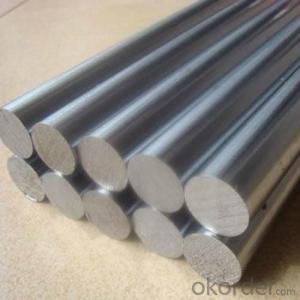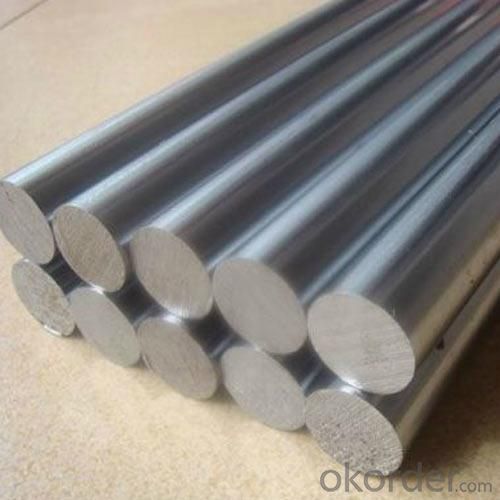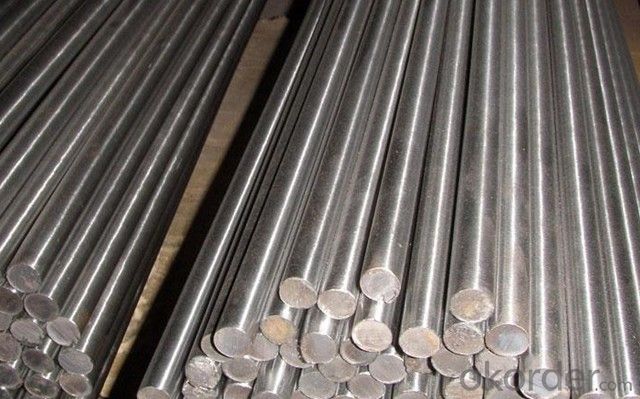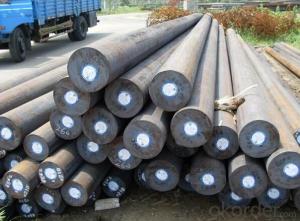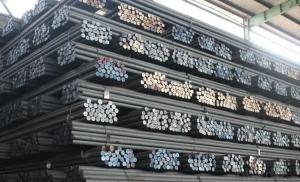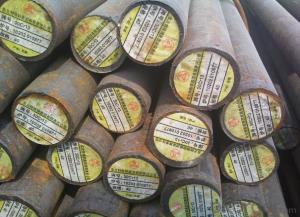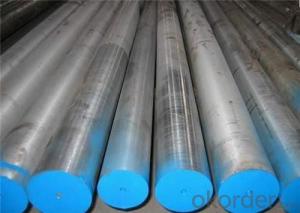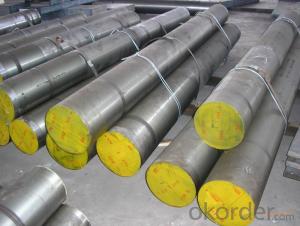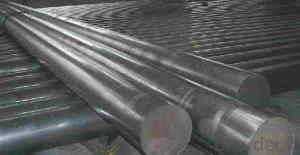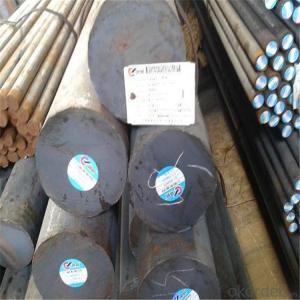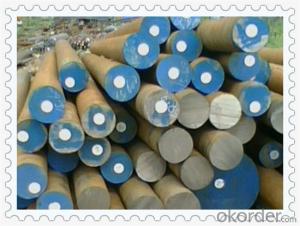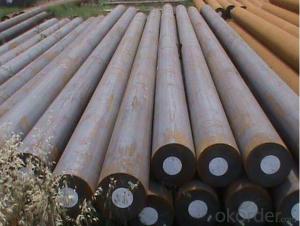Bearing steel SAE52100 / GCr15 round bars
- Loading Port:
- China main port
- Payment Terms:
- TT OR LC
- Min Order Qty:
- 500 m.t.
- Supply Capability:
- 10000 m.t./month
OKorder Service Pledge
OKorder Financial Service
You Might Also Like
Specifications:
1) Grade: Bearing steel SAE 52100 / GCr15 round bars
2) Diameter: 20-500mm
3) Hot rolled/forged, annealed
Application:
Commom steel used to produce balls and rings of bearing. The product has characteristics of uniform-chemical composition, low percentage of harmful elements, high purity, well-distributed carbide, good surface quality. It also has characteristics of wide scope of plastic,stable heat-treatment quality, uniformand high hardness, high wear resistance,high strength of touching fatigue. It has excellent machining property afer spheroidize annealing.
The use of products The product is used to produce balls and rings of bearing. Future Development By rational rolling and cooling process, the product can be spheroidized on-line and can be used in drawing and machining directly by customers. By combining re-spheroidize annealing and re-crystallisation of semi-finished product, the steel wire process can be simplified.
Packaging & Delivery
Mark: Heat No. will be cold stamped and Steel grade, diameter (mm), length (mm), and the manufacturer LOGO and weight (kg) is painted.
Standard seaworthy packing or as customer required
Delivery time: Within 30 days after order is confirmed.
- Q: How is case-hardening steel used in the production of gears and shafts?
- Case-hardening steel is used in the production of gears and shafts to enhance their surface hardness and wear resistance. By subjecting the steel to a specialized heat treatment process, such as carburizing, the outer layer of the metal becomes hardened, while the core remains tough and durable. This case-hardening process ensures that the gears and shafts can withstand the high stresses and loads they experience during operation, resulting in improved performance and longevity.
- Q: What are the challenges in casting special steel?
- Some of the challenges in casting special steel include achieving the desired composition and metallurgical properties, controlling the cooling rate to prevent the formation of defects such as cracks or porosity, ensuring uniformity and consistency in the casting process, and managing the high temperatures and corrosive environments involved. Special steel often requires precise and complex casting techniques, making it more challenging than casting regular steel. Additionally, special steel alloys may have specific requirements for heat treatment or post-casting processing, which adds further complexity to the casting process.
- Q: Can special steel be used in the production of springs for automotive suspension?
- Yes, special steel can be used in the production of springs for automotive suspension. Special steel, such as high-strength or alloy steel, is often preferred for its improved durability, strength, and resistance to fatigue. These properties are critical for springs in automotive suspension systems, as they need to withstand the constant stress and load of the vehicle's weight and provide a smooth ride.
- Q: How does special steel contribute to the defense equipment industry?
- Special steel plays a crucial role in the defense equipment industry by offering superior strength, durability, and performance characteristics that are essential for producing high-quality military equipment. This type of steel is specifically engineered to meet the demanding requirements of defense applications, ensuring the safety and effectiveness of military personnel and operations. One of the key contributions of special steel to the defense equipment industry is its ability to withstand extreme conditions and environments. Military equipment often operates in harsh conditions, including extreme temperatures, high pressures, corrosive environments, and impact forces. Special steel is designed to maintain its structural integrity and performance under these challenging conditions, providing a reliable and long-lasting solution for defense equipment. Moreover, special steel offers exceptional strength and toughness, making it ideal for manufacturing armored vehicles, tanks, and military aircraft. It provides a high level of protection against ballistic threats and can withstand projectile impacts and explosions. The use of special steel in defense equipment ensures the safety of military personnel and enhances their survivability in combat situations. Additionally, special steel is essential for the production of cutting-edge weaponry and munitions. It is used in the manufacturing of firearms, missiles, and artillery systems due to its excellent mechanical properties and ability to withstand high pressures. Special steel also enables precision engineering, ensuring the accuracy and reliability of military firearms and projectiles. Furthermore, special steel contributes to the defense equipment industry by supporting technological advancements. As technology continues to evolve, the defense sector requires materials that can meet the demands of modern warfare. Special steel can be tailored and optimized to meet specific performance requirements, allowing for the development of advanced defense systems such as stealth technology, electronic warfare, and precision-guided munitions. In conclusion, special steel plays a pivotal role in the defense equipment industry by providing the necessary strength, durability, and performance characteristics required for military applications. It ensures the safety and effectiveness of defense personnel and equipment, withstands extreme conditions, enables the production of advanced weaponry, and supports technological advancements in the defense sector.
- Q: How does special steel contribute to the industrial equipment industry?
- Special steel plays a crucial role in the industrial equipment industry by providing superior strength, durability, and resistance to various harsh conditions. Special steel alloys are specifically engineered to possess exceptional properties that make them suitable for a wide range of applications in industrial equipment. One of the key contributions of special steel to the industry is its ability to withstand high temperatures and pressure. This makes it an ideal material for manufacturing components such as boilers, turbines, and heat exchangers. Special steel's high heat resistance ensures that these equipment can operate efficiently and reliably in demanding environments, thereby enhancing overall performance and safety. Furthermore, special steel is renowned for its excellent corrosion resistance, making it highly suitable for manufacturing equipment that comes into contact with corrosive substances. This includes chemical processing equipment, oil and gas pipelines, and marine structures. By using special steel in these applications, the industrial equipment industry can ensure longer operational lifetimes, reduce maintenance costs, and minimize the risk of catastrophic failures. Special steel also contributes to the industry by enabling the production of equipment with superior mechanical properties. Its unique composition and heat treatment processes allow for increased strength, toughness, and wear resistance. As a result, industrial equipment made from special steel can handle heavy loads, endure extreme conditions, and provide long-lasting performance. Additionally, special steel alloys can be tailored to meet specific requirements, allowing for the production of custom-made components. This flexibility enables the industrial equipment industry to design and manufacture equipment that meets the exact needs of various sectors, including aerospace, automotive, energy, and construction. Special steel's versatility and adaptability thus play a vital role in driving innovation and technological advancements within the industry. In conclusion, special steel significantly contributes to the industrial equipment industry by providing exceptional strength, durability, resistance to harsh conditions, and customized solutions. Its unique properties make it an essential material for manufacturing a wide range of equipment, ultimately enhancing performance, reliability, and safety across various sectors.
- Q: What are the different methods of surface polishing for special steel?
- Different methods can be used to polish special steel surfaces, each offering its own advantages and applications. These methods include mechanical polishing, electrochemical polishing, chemical polishing, electropolishing, and vibratory polishing. Mechanical polishing utilizes abrasive materials to eliminate surface imperfections and create a smooth and reflective surface. This can be done manually or with automated polishing machines. It is effective for removing scratches, dents, and other defects. Industries such as automotive, aerospace, and precision engineering commonly employ this method. Electrochemical polishing, also known as electrolytic polishing, involves using an electrolyte solution and electric current to dissolve and eliminate surface material. It is particularly useful for complex shapes and hard-to-reach areas, providing a high level of surface smoothness. This method is frequently used in industries like medical devices, semiconductors, and jewelry manufacturing. Chemical polishing selectively removes surface material and creates a smooth finish using chemical solutions. It is effective for eliminating oxide layers, stains, and contaminants. This method is often used for stainless steel and other corrosion-resistant alloys. The process involves immersing the steel in a chemical bath and controlling factors like temperature, concentration, and time. Electropolishing combines the benefits of electrochemical and chemical polishing. It applies an electric current to remove surface material while dissolving it in an electrolyte solution. Electropolishing produces a highly smooth, clean, and corrosion-resistant surface finish. It is commonly used in industries such as pharmaceuticals, food processing, and semiconductor manufacturing. Vibratory polishing utilizes vibrating media and a polishing compound to remove surface imperfections. Steel parts are placed in a vibratory tumbler or bowl, where continuous movement causes the media to rub against the parts, resulting in a polished surface. This method is commonly used for small or delicate parts and can be a cost-effective and efficient option. When choosing a surface polishing method for special steel, factors such as desired surface finish, part geometry, material properties, and industry requirements should be considered. Consulting with experts or specialists is important to determine the most suitable method for a specific application.
- Q: How does special steel contribute to the mining machinery industry?
- The mining machinery industry relies heavily on special steel, which provides exceptional strength, durability, and resistance to wear and corrosion. This specific type of steel is engineered to withstand the harsh conditions typically encountered in mining operations. In the mining machinery industry, equipment such as drills, excavators, loaders, crushers, and conveyor systems face extreme stress, heavy loads, and abrasive materials. Various parts of these machines, including buckets, tracks, cutting edges, gears, and hydraulic components, incorporate special steel components. The high strength and toughness of special steel ensure that mining machinery can endure the immense forces and impacts involved in mineral excavation, hauling, and processing. This durability extends the lifespan of the equipment, reducing the need for frequent replacements and minimizing downtime, resulting in cost savings for mining companies. Special steel's resistance to wear and corrosion is crucial in the mining industry. The presence of abrasive materials and corrosive substances in the mining environment can cause rapid deterioration of machinery components. However, special steel alloys are designed to resist wear and corrosion, enhancing the longevity and performance of mining machinery. Additionally, special steel allows mining machinery to operate efficiently and effectively. Its high strength-to-weight ratio allows for the construction of lightweight yet robust equipment, improving mobility and productivity in mining operations. The use of special steel also enables the design of complex components with intricate shapes, ensuring optimal functionality and performance. Overall, special steel is an essential material in the mining machinery industry. Its exceptional strength, durability, resistance to wear and corrosion, and ability to enhance efficiency make it a vital component in the design and construction of mining equipment. By incorporating special steel, mining machinery can withstand the challenging conditions and heavy-duty tasks involved in mining operations, ultimately contributing to increased productivity, reduced costs, and improved safety in the industry.
- Q: Can special steel be used for making nuclear industry components?
- Yes, special steel can be used for making nuclear industry components. Special steel, also known as alloy steel, possesses certain properties that make it suitable for use in the nuclear industry. These properties include high strength, excellent corrosion resistance, and good resistance to high temperatures and radiation. Nuclear industry components, such as reactor pressure vessels, steam generators, and fuel rods, operate under extreme conditions of high pressure, high temperature, and exposure to radiation. Special steel can withstand these conditions and maintain its structural integrity, ensuring the safe and reliable operation of nuclear facilities. The use of special steel in the nuclear industry also helps to prevent the release of radioactive materials. The high corrosion resistance of special steel reduces the risk of leakage and contamination, thereby enhancing the safety of nuclear power plants. Furthermore, special steel can be tailored to meet specific requirements of the nuclear industry. Different types of special steel alloys can be developed with specific compositions and heat treatments to optimize their properties for nuclear applications. This allows for the customization of steel components to meet the unique demands of the nuclear industry. In conclusion, special steel can indeed be used for making nuclear industry components due to its high strength, corrosion resistance, and resistance to high temperatures and radiation. Its use contributes to the safety and reliability of nuclear facilities, while also allowing for customization to meet specific requirements.
- Q: How does special steel contribute to the manufacturing aftermarket industry?
- Special steel plays a significant role in the manufacturing aftermarket industry by offering enhanced performance, durability, and reliability in the production of various components and equipment. One of the key contributions of special steel is its ability to withstand extreme conditions, such as high temperatures, corrosive environments, or heavy loads. This makes it an ideal material for manufacturing critical parts used in industries like automotive, aerospace, energy, and machinery. In the manufacturing aftermarket industry, special steel is commonly used in the production of replacement parts for machinery or equipment that have become worn out or damaged over time. The use of special steel ensures that these replacement parts possess the necessary strength and resilience to meet the original equipment manufacturer (OEM) specifications. Furthermore, special steel allows for the development of innovative designs and the production of more efficient and lightweight components. This helps in improving the overall performance of the equipment, reducing energy consumption, and enhancing productivity. For example, in the automotive industry, special steel is used to manufacture lightweight engine components, resulting in improved fuel efficiency and reduced emissions. Moreover, the use of special steel in the manufacturing aftermarket industry contributes to the reduction of maintenance and downtime costs. By using high-quality steel, the longevity of the replacement parts is increased, reducing the frequency of repairs or replacements. This leads to a decrease in production downtime and associated costs, as well as improving the overall reliability of the equipment. Additionally, special steel offers a wide range of customization options, enabling manufacturers to tailor the material properties to specific requirements. This flexibility allows for the development of unique solutions and the production of specialized components that meet the demands of various industries. It also enables manufacturers to address specific challenges related to wear resistance, hardness, or toughness, which are crucial factors in the aftermarket industry. In conclusion, special steel contributes significantly to the manufacturing aftermarket industry by providing enhanced performance, durability, and reliability to replacement parts. Its ability to withstand extreme conditions, enable innovative designs, reduce maintenance costs, and offer customization options makes it an indispensable material in the production of components and equipment in various industries.
- Q: How does the heat treatment process affect special steel?
- The heat treatment process can significantly impact the properties of special steel. It involves heating the steel to a specific temperature and then cooling it in different ways to achieve desired hardness, strength, and other mechanical properties. By carefully controlling the heating and cooling rates, the heat treatment process can alter the microstructure of the steel, allowing for the formation of various phases and structures. This can result in improved hardness, toughness, and wear resistance, making the special steel more suitable for specific applications. Additionally, heat treatment can also relieve internal stresses and improve dimensional stability, enhancing the overall performance and durability of the special steel.
Send your message to us
Bearing steel SAE52100 / GCr15 round bars
- Loading Port:
- China main port
- Payment Terms:
- TT OR LC
- Min Order Qty:
- 500 m.t.
- Supply Capability:
- 10000 m.t./month
OKorder Service Pledge
OKorder Financial Service
Similar products
Hot products
Hot Searches
Related keywords
